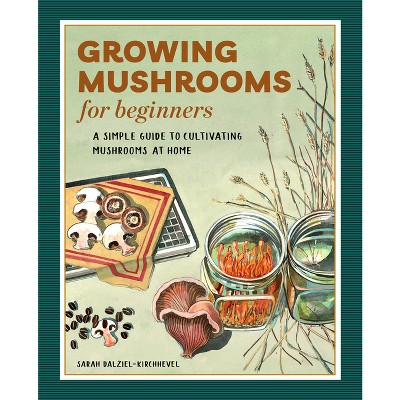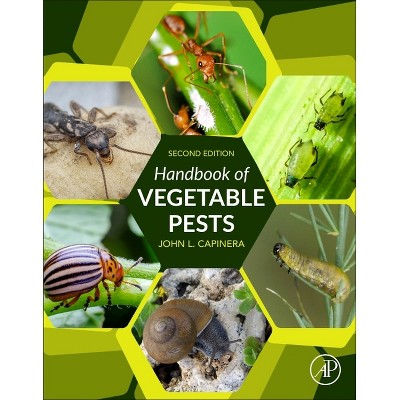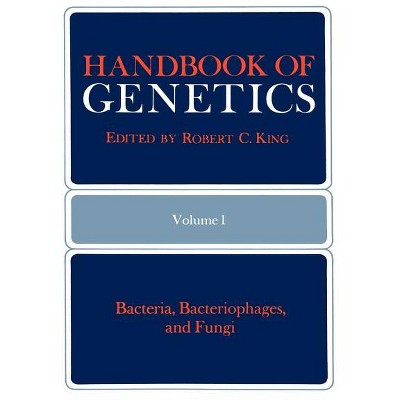Sponsored

Cereals - (Handbook of Plant Breeding) by Marcelo J Carena (Hardcover)
In Stock
Sponsored
About this item
Highlights
- Agriculture depends on improved cultivars, and cultivars are developed with the aid of proper plant breeding.
- About the Author: Marcelo Carena is Associate Professor from the Department of Plant Sciences at the North Dakota State University (NDSU), Fargo, ND, USA.
- 426 Pages
- Science, Life Sciences
- Series Name: Handbook of Plant Breeding
Description
About the Book
The objective of this volume is to increase the utilization of useful genetic resources and to raise awareness of the value of plant breeding and biotechnology. These, it argues, should lead to more sustainable crop production and ultimately food security.
Book Synopsis
Agriculture depends on improved cultivars, and cultivars are developed with the aid of proper plant breeding. Unfortunately, applied plant breeding programs that focus on cereal commodity crops are under serious threat due to a lack of funding. This volume is designed to increase the use of helpful genetic resources and increase awareness of the value and impact of cereal breeding and biotechnology. This, in turn, should lead to more sustainable crop production and ultimately food security. All the major cereal crops--from maize to sorghum to rice--are covered, with discussions of genetic diversity, breeding methods and techniques, integration of new biotechnologies, and seed production in each chapter.
From the Back Cover
Handbook of Plant Breeding series
Cereal Breeding
Marcelo J. Carena Editor
Agriculture depends on improved cultivars, and plant breeders are those who develop improved cultivars through proper germplasm choice. Breeding methods and molecular tools are secondary to germplasm choice in plant breeding. The lack of funding presents a serious threat to plant breeding programs focused on cereal commodity crops. This loss of public support affects breeding continuity, objectivity, and, perhaps equally important, the training of future plant breeders for the utilization and improvement of current plant genetic resources, especially those that are genetically broad based. The research products of breeding programs are important not only for food security, but also for commodity-oriented public and private programs, especially on the fringes of crop production and rural communities.
This volume, as part of the Handbook of Plant Breeding series, aims to increase utilization of plant genetic resources and to heighten awareness of the value and impact of plant breeding and biotechnology. Ensuring strong applied plant breeding programs with targeted use of molecular tools to specific traits (e.g. qualitative and highly heritable traits that are difficult to measure) will be essential in ensuring a sustainable use of plant genetic resources. We have an opportunity to greatly enhance agricultural production and value through germplasm adaptation, increased genetic diversity on farms, and maximization of genetic improvement under environmental stresses to meet the growing demands for food security, food quality, and environmental conservation.
Cereals presents breeding efforts in major cereal crops (maize, sorghum, rice, spring wheat, winter wheat, durum wheat, barley, rye, and triticale) and chapters devoted to increasing the value of cereal breeding under different scenarios (GxE interaction, grain quality, silage quality, and participatory plant breeding). We hope to include other cereal crops in future editions.
The book is a novel and exciting contribution to the field of cereal breeding and should be of great interest to students and scientists alike. Thirty-nine authors representing over 10 developed and developing countries as well international centers (e.g. CIMMYT, ICARDA, FAO) have done an excellent job sharing knowledge and experience to the next generation of plant breeders that will develop the future cultivars for different purposes. We feel this book is very opportune since there has been a serious erosion of public plant breeders especially in the past 10 years.
This book is a call to policy makers, breeders, educators, instructors, students, industry leaders, grant donors, grant reviewers, economists, and many others to meet the need for continuous and holistic long-term applied plant breeding programs that will supply the future generation of plant breeders. Without them, there will be no development of future cultivars. More than ever, scientists are encouraged to be creative in their search for needed research in order to address current and future challenges before searching for funding. The conduction of long-term research with applied impact will be beneficial as well as the exploration of plant breeding paradigms and scientific alternatives between enhanced productivity (and uniformity) and enhanced quality of life for all human beings. Millions of people have the right to access to adequate food (FAO, 2008). While food distribution is still a challenge all over the world to alleviate hunger, there is still enough food for an increasing human population and cereal breeding is the best investment to maintain enough food supply under the environmental challenges facing our planet (e.g. global warming, biofuel demand, abiotic stresses).
Marcelo Carena is Associate Professor from the Department of Plant Sciences at the North Dakota State University (NDSU), Fargo, ND, USA. Since 1999, Dr. Carena is the Director of the NDSU Corn Breeding and Genetics Program, the most northern public corn research program in North America focused on increasing genetic diversity, drought tolerance, and grain quality in early maturing maize cultivar development. He teaches Quantitative Genetics and Crop Breeding Techniques at NDSU. Prof. Carena is currently Editor of Euphytica and Maydica, and Chair of the Crop Science Society of America Maize Registration Committee. Dr. Carena has trained five Ph.D. and eight MS students, two Visiting Scientists, and several interns over the past 10 years. In the same time, he has released eight early maturing corn inbred lines, has released four improved early maturing populations, and has published over 50 scientific papers, abstracts, book chapters, and editions on maize breeding and genetics.
Review Quotes
From the reviews:
"This volume brings together a panel of international experts in the field to summarize the current state of progress in breeding cereal crops. Chapters describe genetic backgrounds, germplasm and molecular resources, major breeding achievements, and current breeding goals for most of the major cereal crops, excluding oats. ... this volume nicely summarizes the current state of the field and will thus be an excellent resource for students and practitioners. Summing Up: Highly recommended. Upper-division undergraduate through professional collections." (R. M. Warner, Choice, Vol. 47 (1), September, 2009)
About the Author
Marcelo Carena is Associate Professor from the Department of Plant Sciences at the North Dakota State University (NDSU), Fargo, ND, USA. Since 1999, Dr. Carena is the Director of the NDSU Corn Breeding and Genetics Program, the most northern public corn research program in North America focused on increasing genetic diversity, drought tolerance, and grain quality in early maturing maize. He teaches Quantitative Genetics and Crop Breeding Techniques at NDSU. Prof. Carena is currently Editor of Euphytica and Maydica, and Chair of the Crop Science Society of America Maize Registration Committee. Dr. Carena has trained five Ph.D. and eight MS students, two Visiting Scientists, and several interns over the past 10 years. In the same time, he has released eight early maturing corn inbred lines, has released four improved early maturing populations, and has published over 50 scientific papers, abstracts, book chapters, and editions on corn breeding and genetics.
Shipping details
Return details
Trending Non-Fiction

















